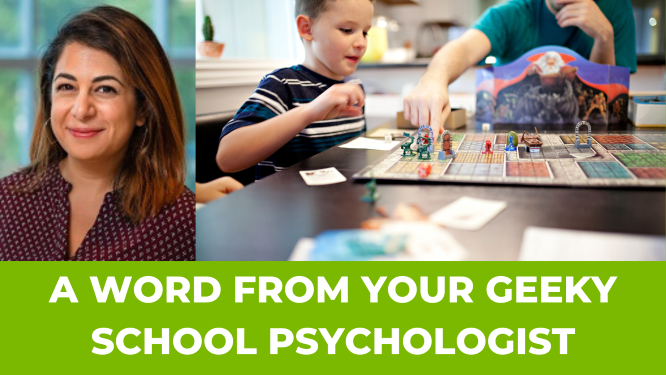A Word from Your Geeky School Psychologist: Build Social Emotional Learning, Nerd Style

A Word from Your Geeky School Psychologist:
Build Social Emotional Learning, Nerd Style
Shereen Naser, Ph.D.
You are sitting quietly. The room is comforting, well lit, and everyone seems jovial. They are chatting nonchalantly, sipping a beverage as they pass cards around the circle. While on the outside all look calm, on the inside each person is tense with anticipation, aware that in less than five minutes it will be imperative to identify spies or werewolves amongst them in order to save humanity. A poor joke is meekly stuttered by a young man in a shirt obtained from a mail-order geek supply store. He hiccups right after the punch line, his nerves getting the best of him. These are your friends, but also your mortal enemies. Any number of these seemingly innocent participants could be secretly working to thwart your every mission or quest. You don’t know who you can trust. All the cards are passed around, and you are instructed to look at yours only to find out… the spy is you.
This scene is a regular occurrence at any tabletop game night. Though traditionally labeled “board games,” so many of the activities available to gamers now have no board. Instead they rely on a simple deck of less than 20 cards and individuals ready to work together to create a space of organized chaos. Games like One Night Ultimate Werewolf, The Resistance, and Avalon mimic the traditional Mafia a number of us played as children, tasking each player with either lying about an assigned identity or trying to root out others lying about their assigned identity. As a psychologist working primarily with youth in the school setting, and as a college professor, my first reaction is that a game involving copious amounts of deception can’t be any good. The truth is however, that the more I play these games the more convinced I become that they are the perfect opportunity to learn about community building and social emotional skills.
Social emotional learning refers to learning that allows children and adults to acquire skills in regulating their emotions, making and working towards positive goals, building empathy for others, establishing and maintaining positive relationships, and making good decisions. These skills set people up for succes by equipping them with tools to overcome struggles, meet goals, and effectively engage with others. Research tells us that kids who have these skills are significantly better learners and that schools that practice social emotional learning are more successful schools.
While some of our kids may be better than others with these skills, there is no doubt that they are important to practice in order to be more effective at pretty much everything. Job interview? Great, pull out your empathy, relationship, and decision-making skills. Have a big test coming up? Time to regulate those emotions. Hidden identity games are a tool to teach social emotional learning but can also help take schools and parents from just teaching about social emotional learning skills to helping youth see the immediate importance of them and give them an opportunity to practice those skills.
One important social skill that games like One Night Werewolf reinforce is effectively working in a group. In a recent article in The Atlantic, Julie Beck uses One Night Werewolf to illustrate findings of a study indicating that discussing leads to better decision making, especially when trying to point out liars. Hidden identity games by their very nature force players to share ideas effectively by quickly developing rules of organized discussion without someone standing over them as they dutifully raise their hands. In real life no one waits for your to raise your hand to answer a question. In fact, as a college professor, in my smaller and mid-sized courses I instruct many of my students to forgo the hand raising and to use their social skills to assert an opinion or ask a question at the appropriate time. While we usually struggle the first day or two, by the third class things are running very smoothly with students feeding off each other’s comments and politely disagreeing instead of only talking at me and expecting me to say they are right or wrong. These skills translate to being able to complete group assignments in school or to helping to build a more collaborative workplace.
There are a multitude of tabletop games that promote social emotional learning, including cooperative games like Pandemic, and even competitive games like Dixit, which can work especially well for students who are learning new languages since there are few reading components. However, hidden identity games have a singular advantage as they often accommodate a large number of players at once and utilize the same critical thinking skills and group decision making requirements as some of the smaller games with more pieces. So now that you’re convinced the important children in your life can’t live without these games, hop into your local game store and start practicing those social emotional skills today!
Dr. Shereen Naser is a school psychologist by training and a geek by choice. She received her B.S. in Psychology from the University of Texas, Austin and her Ph.D. from Tulane University in New Orleans. Dr. Naser practiced as a school psychologist in New Orleans before moving to teach and conduct research at Cleveland State University. Her work as a school psychologist has her constantly searching for the best ways to equip youth with the skills they need to not only be personally successful, but to also have a positive impact on their community.
If you have questions or need suggestions on utilizing board games in your classroom, community, or home to build social emotional learning you can contact Dr. Naser at nasersc@gmail.com.

